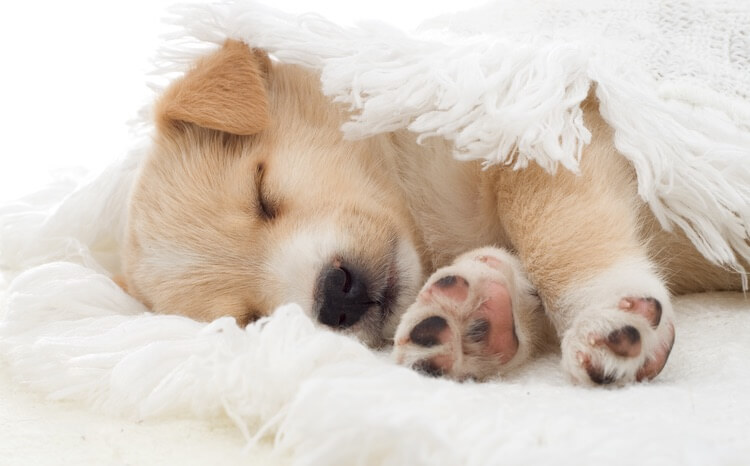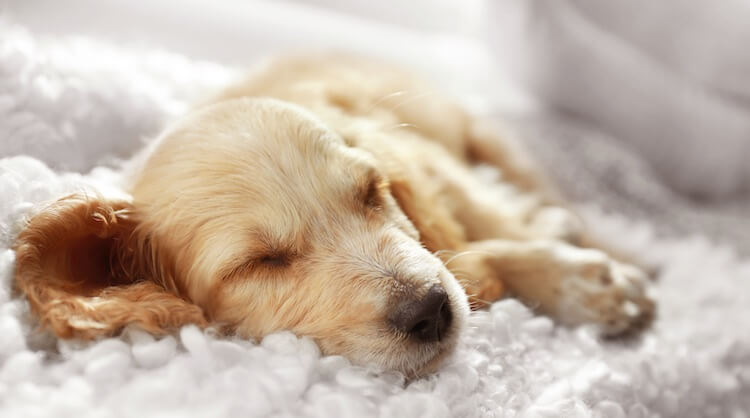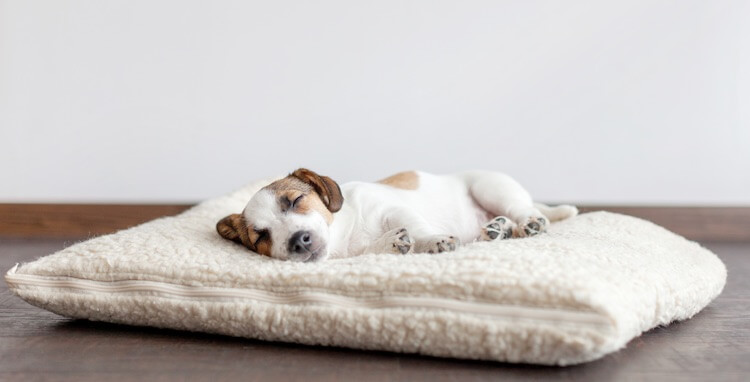Why do puppies sleep so much?
Some new dog owners mistakenly believe that their puppy sleeps too much. They purposely wake the pet during the day so that it “sleeps better at night.” Others interrupt sleep for playtime and petting. And I understand the desire to spend more time with your cute little puppy. But keep yourself in check.
Puppies sleep so much for a reason. During puppyhood, their bodies develop at a breakneck pace. It takes a lot of energy for the bones, muscles, and brain (and therefore the nervous system) to develop properly. The consequences of sleep deprivation in dogs can be stress, anxiety, aggression, and other behavioral disorders.
Just imagine, a dog develops in a year like a human develops in 18 years!
How to set a sleep schedule for a puppy?
First, well determine how much your puppy sleeps at night and then distribute the remaining sleep time throughout the day. Typically, dogs between 7-16 weeks can sleep 6-8 hours, but they still need to take a potty break at night.
So if your dog wakes up at night, it means it needs to pee. Do not play or pay attention to it during this time.
But there is one problem with sleeping at night. Puppies are often difficult to tuck, and they also dont want to sleep alone. So your job is to:
What time should the puppy go to bed? Going to bed one hour after meals and an evening potty walk is advisable. Specific times dont matter; you have to build a schedule to suit you. Although tiny puppies cant sleep as long as humans, after 16 weeks, you can train your puppy to go to bed and get up with you.
Dogs wake up as the sun rises. So if you want to push back the wake-up time, then put the dog bed in a darker place.
Usually, you dont need to take any action to get your puppy to sleep during the day. They will do it anyway. What your job is:
Although the daytime sleep schedule will be flexible, its advisable to make sure that your puppy has several two-hour naps. Their number depends on age, as does the total amount of sleep in a 24-hour period:
According to all the advice in this article, lets make a rough daily schedule for a 12-week old puppy:
Ensure your furbaby has a comfortable, quiet place to sleep and stick to its routine. Then everyone in the house will sleep peacefully!
Why Is Sleep Important For Puppies?

Returning to Dr. Manaceine’s study, she found that sleep deprivation significantly affected the puppies’ brains. In the absence of sleep, fat degeneration, blood vessel abnormalities, and hemorrhaging occurred.
The brain is the command center for the nervous system. It is divided into three main sections:
We know how a diet limited in lipids can detrimentally affect the brain and contribute to neurological disease, but sleep deprivation had a worse impact on these puppies.
Sleep is essential to your puppy’s vital functions. It plays a part in energy conservation, brain waste clearance, immune system modulation, cognition, performance, disease, and psychological state.
Many studies since Dr. Manaceine’s, have demonstrated that sleep loss during puppy development can result in reduced brain mass, neuronal death, and subsequent behavioral problems. Impaired sleep in puppies is also a contributing factor in cases of cancer and type II diabetes.
Sleep is essential to your puppy’s life. Without it, it massively affects the control center (that is their brain) and can cause a range of consequential health problems in their juvenile years
Puppies undergo much more rapid development than the equivalent human child; for example, the average 7-week old puppy is as developed as a 9-month old human baby. Dogs are also said to be fully matured anywhere between 1-2 years of age (depending on breed).
For a puppy to reach maturity (both healthy and happy), sleep is necessary for their cognitive changes, emotional challenges, and physical transformation. Puppies use sleep to consolidate what they have learned that day. Whether it is a new trick or simply to avoid chewing the legs of the chair.

Because of the huge amount of developing puppies need to do in such a short period of time, they spend most of their first two-months, asleep.
Adult dogs, in a laboratory setting, when left alone, will sleep on average for around 13 hours per day. Dogs are diurnal, which means they are active during daylight hours.
Puppies can sleep for anywhere between 18-20 hours per day. You will notice higher activity levels in the morning followed by a rest, then reduced activity around noon and into the afternoon.
They will sleep generally after they have been playing, learning new skills, been out for a walk, or have just eaten food.
The experiences that your puppy has during the day can affect the type and quality of sleep they have. Studies have found that after a negative experience, puppies will fall asleep more quickly. This is known as protective sleep and is a response to high-stress levels.
It is sometimes easy to attribute an “exhausted” pup to the busyness of the day. Be mindful, as their sleeping habits could be more indicative of their experiences.
Many new dog owners enforce “official sleep time” during the night. Where you want your puppy to sleep is a personal preference. Some owners opt to crate train their puppy and some are happy having them sleep in bed with them.
Many puppies are good at self-regulating their naps especially if you are thoroughly unexciting and boring. The important thing is if your boy is due a nap and he’s wild, offer him a calming task and be totally quiet and calm.

For a large part of your puppy’s life; they will only be awake for between four to six hours a day. You should keep this in mind when planning their training and socializing.
Any training session should be kept short, it is important to not overwhelm them as we know negative experiences can impact their development and their quality of sleep.
Do Puppies sleep a lot at 3 months?
As with human babies, puppies need quite a bit more sleep than adult dogs. Very young puppies (less than 2 weeks old) sleep around 90% of the time. Thatâs almost 22 hours out of a 24-hour period. As a veterinarian, I have had more than one little pup fall asleep on the exam table during a puppy checkup.
As puppies get older, they sleep less. The average 4-month-old puppy sleeps a little over 11 hours in a 24-hour period, and the average adult sleeps 10-11 hours in a 24-hour period. While the total amount of sleep for older puppies and adults seems roughly the same, keep in mind that naps are a bigger portion of a puppyâs sleep schedule. Adult dogs tend to sleep longer at night, with short naps during the day, whereas puppies tend to nap more and for longer periods during the day and sleep less at night.